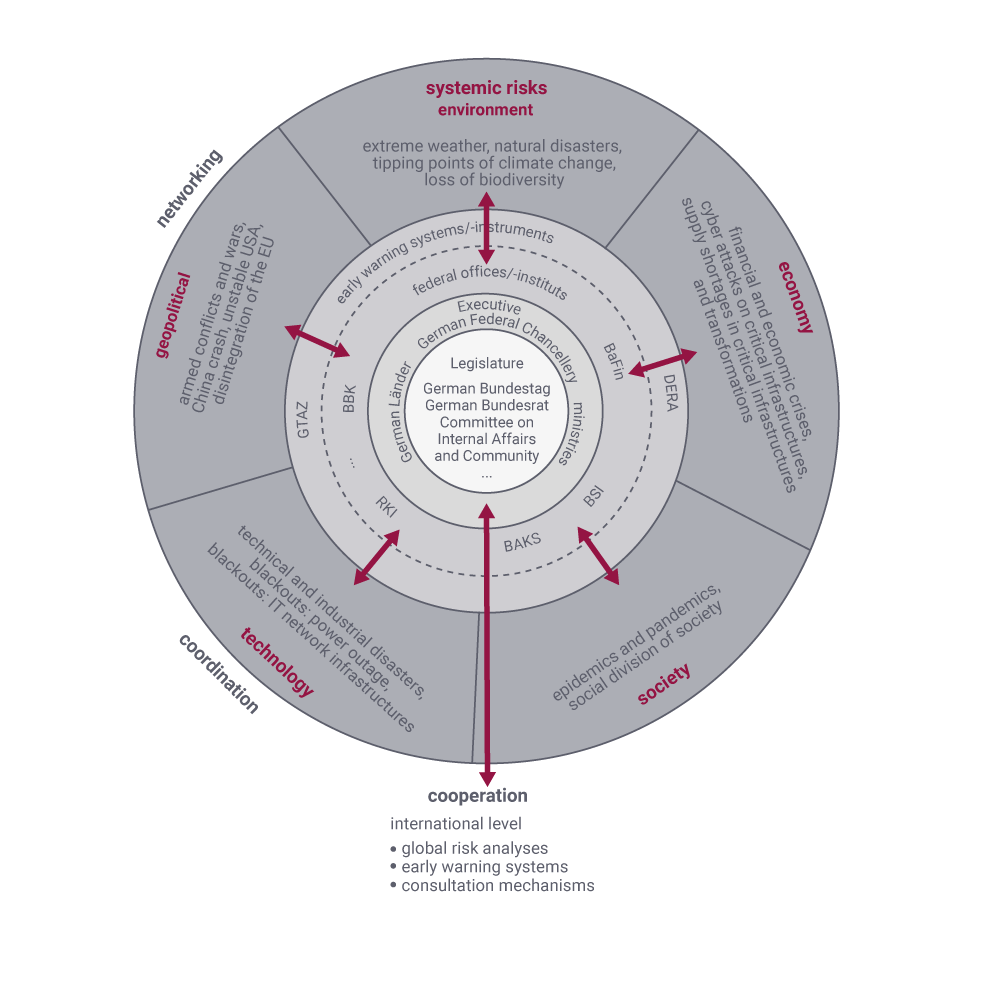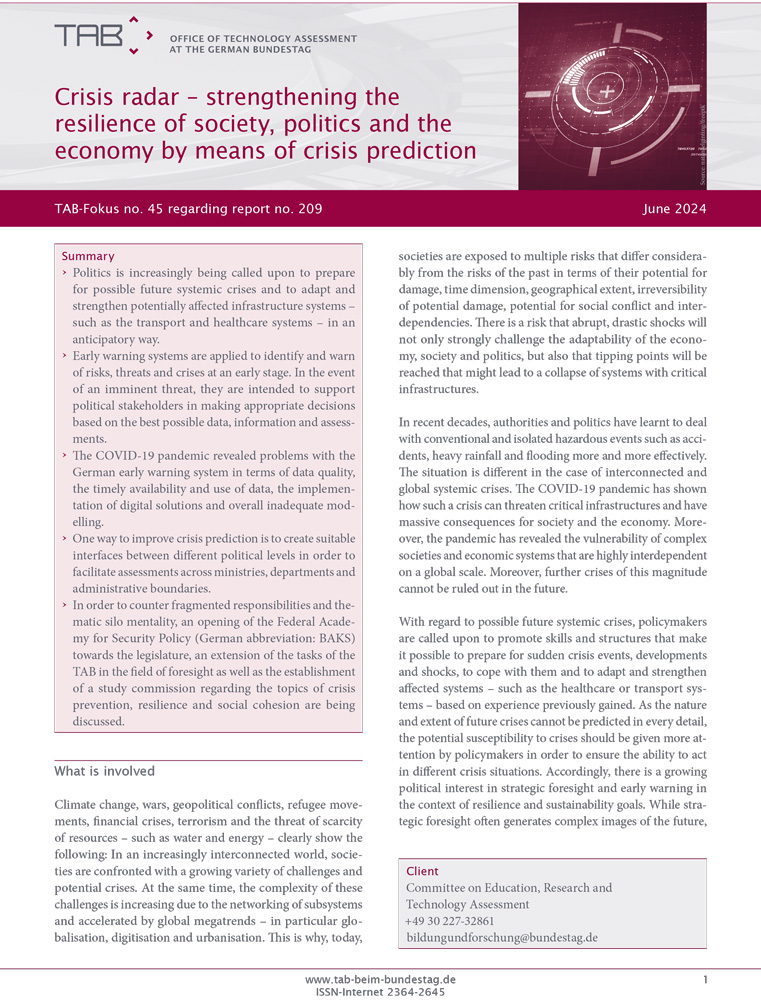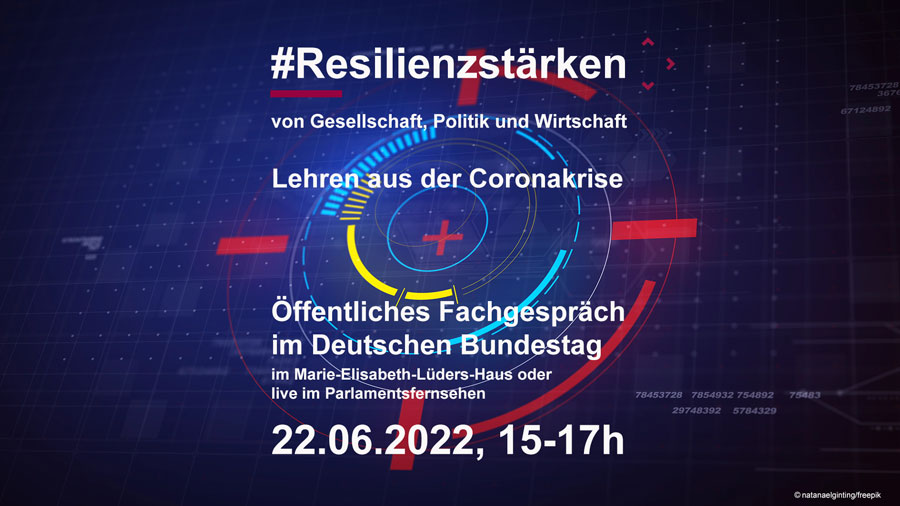
Crisis radar - strengthening the resilience of society, politics and the economy by means of crisis prediction
- Project team:
Siegfried Behrendt (Project Manager), Michaela Evers-Wölk, Ingo Kollosche, Christoph Revermann, Arnold Sauter, Matthias Sonk, Dirk Thomas, André Uhl
- Thematic area:
- Topic initiative:
Committee on Education, Research and Technology Assessment
- Analytical approach:
TA project
- Startdate:
2021
- Enddate:
2023
The final report of the TA project was accepted by the Committee for Education, Research and Technology Assessment on 5 June 2024 and was published together with a policy brief TAB-Fokus on 26 June 2024.
How to strengthen the social, politcal and economical resilence

Summary
- Politics is increasingly being called upon to prepare for possible future systemic crises and to adapt and strengthen potentially affected infrastructure systems – such as the transport and healthcare systems – in an anticipatory way.
- Early warning systems are applied to identify and warn of risks, threats and crises at an early stage. In the event of an imminent threat, they are intended to support political stakeholders in making appropriate decisions based on the best possible data, information and assessments.
- The COVID-19 pandemic revealed problems with the German early warning system in terms of data quality, the timely availability and use of data, the implementation of digital solutions and overall inadequate modelling.
- One way to improve crisis prediction is to create suitable interfaces between different political levels in order to facilitate assessments across ministries, departments and administrative boundaries.
- In order to counter fragmented responsibilities and thematic silo mentality, an opening of the Federal Academy for Security Policy (German abbreviation: BAKS) towards the legislature, an extension of the tasks of the TAB in the field of foresight as well as the establishment of a study commission regarding the topics of crisis prevention, resilience and social cohesion are being discussed.
sprungmarken_marker_1724
What is involved
Climate change, wars, geopolitical conflicts, refugee movements, financial crises, terrorism and the threat of scarcity of resources – such as water and energy – clearly show the following: In an increasingly interconnected world, societies are confronted with a growing variety of challenges and potential crises. At the same time, the complexity of these challenges is increasing due to the networking of subsystems and accelerated by global megatrends – in particular globalisation, digitisation and urbanisation. This is why, today, societies are exposed to multiple risks that differ considerably from the risks of the past in terms of their potential for damage, time dimension, geographical extent, irreversibility of potential damage, potential for social conflict and interdependencies. There is a risk that abrupt, drastic shocks will not only strongly challenge the adaptability of the economy, society and politics, but also that tipping points will be reached that might lead to a collapse of systems with critical infrastructures.
In recent decades, authorities and politics have learnt to deal with conventional and isolated hazardous events such as accidents, heavy rainfall and flooding more and more effectively. The situation is different in the case of interconnected and global systemic crises. The COVID-19 pandemic has shown how such a crisis can threaten critical infrastructures and have massive consequences for society and the economy. Moreover, the pandemic has revealed the vulnerability of complex societies and economic systems that are highly interdependent on a global scale. Moreover, further crises of this magnitude cannot be ruled out in the future.
With regard to possible future systemic crises, policymakers are called upon to promote skills and structures that make it possible to prepare for sudden crisis events, developments and shocks, to cope with them and to adapt and strengthen affected systems – such as the healthcare or transport systems – based on experience previously gained. As the nature and extent of future crises cannot be predicted in every detail, the potential susceptibility to crises should be given more attention by policymakers in order to ensure the ability to act in different crisis situations. Accordingly, there is a growing political interest in strategic foresight and early warning in the context of resilience and sustainability goals. While strategic foresight often generates complex images of the future, early warning systems serve to identify future developments as precisely as possible and assess the associated need for action. Furthermore, early warning systems focus on the early warning of risks, threats and crises. However, questions arise as to what deficits exist in the early detection of systemic risks and what options for action can contribute to improving crisis prediction in order to strengthen the resilience of the economy and society.
How do early warning systems work?
Early warning systems are applied to identify and warn of risks, threats and crises at an early stage. In the political context, they are intended to support political stakeholders or the administration in making appropriate decisions based on the best possible data, information and assessments in the event of an imminent threat. In Germany, risk prevention and thus also the use of early warning systems is organised and differentiated at the federal level. For example, the German Länder are responsible for disaster control, while at the federal level the Federal Office of Civil Protection and Disaster Assistance (BBK) – a specialised agency of the Federal Ministry of the Interior and Community – is the central authority for civil protection in Germany. Among other things, it operates the German Joint Information and Situation Centre (GMLZ) and the German Emergency Preparedness Information System (deNIS) and conducts ongoing risk analyses of the Federal Government.
Basically, early warning systems can be divided into indicator-based and event-based systems. While indicator-based early warning systems are orientated towards previously defined operational key figures based on structured data, event-based early warning systems attempt to identify – from unstructured data – events that might represent an acute risk to individuals or societies. Examples showing the application of both approaches can be found in the field of health-specific early warning systems. In addition to these two types of early warning systems, some integrative, interconnected systems are also used in order to identify potential hazards, threats and risks at an early stage using different objectives, processes and technologies.
The terms “passive” and “active” early warning systems largely correspond to these two approaches. While passive or indicator-based systems primarily take into account data that is already documented (such as the reporting of notifiable diseases and pathogens), event-based systems actively and specifically search for relevant information, such as the emergence of further cases after an outbreak of the disease has become known. In addition to detecting disease outbreaks, an indicator-based approach is particularly suitable e. g. for tracking trends in the course of infections. An event-based approach, however, offers the advantage of high speed with regard to the provision of up-to-date information – provided that this information has been sufficiently verified. Ideally, health-specific early warning systems utilise a combination of both approaches in order to give an overall picture of the situation.
Evaluation of the German early warning system used during the COVID-19 pandemic
An evaluation of the German early warning system used in the course of the COVID-19 pandemic mainly revealed problems in terms of data quality, the timely availability and use of data, the implementation of digital solutions that have been developed, but also an overall inadequate modelling. This impaired data-based preparation for political decision making. The descriptive indicators used within the framework of the reporting system were subject to measurement errors and delays, as the reported infection figures did not correspond with the actual number of infections. The fluctuating test intensity has significantly influenced the incidence figures, while the number of unreported cases was not taken into account in the figures. Statistical instruments at the national level might help to address these shortcomings. In addition, extending early warning to sewage-based systems might contribute to identifying both known and new virus variants at an early stage, regardless of whether human tests are carried out or not. To date, sewage monitoring systems have not been established in Germany for early warning in a pandemic, but are increasingly being tried and tested. When evaluating the early warning system in Germany, it must also be considered that the indicators anchored in the reporting system during the COVID-19 pandemic did not take into account target-oriented and action-oriented indicators. Indicators to describe activities and instruments that are needed to achieve politically desired goals were not measured during the pandemic.
In view of the enormous and heterogeneous volumes of data, traditional statistical methods and indicator systems for early warning in times of a pandemic are not sufficient to identify both recurring and unexpected structures. Prognostic modelling is useful for assessing occurrences of infections and the provision of healthcare for the population. For example, dynamic estimates of patients requiring intensive care might help to identify possible capacity shortages at an early stage and take into account corresponding data-based changes in healthcare management. So far, however, systems and strategies focusing on prevention and foresight (Predictive Analytics) have only been implemented to a limited extent. Prognostic estimates are not part of the reporting system for infectious diseases. This is why the indicators used in the reporting system were only suited for political control to a limited extent. Thus, there is a certain need for optimisation with regard to this issue.
Another weakness of the reporting system refers to the time factor. It can take up to 24 hours each to pass on a notification from one level to the next, i. e. from the institutions subject to reporting obligations to local health authorities, regional offices of the Länder and the Robert Koch Institute (RKI). This means that it can take up to 72 hours for a suspected case to actually become an official emergency that triggers the early warning process. The time problem was further exacerbated by the fact that the digitisation of reporting channels was still patchy – especially at the beginning of the COVID-19 pandemic.
Moreover, the passive nature of the German reporting system also involves weaknesses. Before the RKI initiates the legally governed transition from early detection to early warning, the RKI must rely on the fact that corresponding cases of pathogens are reported by the institutions subject to reporting obligations, such as doctors' surgeries, hospitals and laboratories. This might be a problem particularly in the case of newly emerging viruses that are not yet categorised as reportable pathogens. Only when the report reaches the RKI via the local and regional health authorities and the RKI issues a corresponding warning, the status changes from early detection to early warning and the reporting system switches from passive to active tracking.
Options for action to improve crisis preparedness
In Germany, numerous institutions, authorities and bodies at various levels are involved in the early detection of crises and the identification of associated vulnerabilities. Taken together, this multi-level system fulfils the function of a crisis radar, in which the legislature is represented at the first level by the German Bundestag, the Länder parliaments and the Bundesrat, with different committees being responsible depending on the respective subject area. The second level comprises the German Federal Chancellery and the ministries, each of which is in charge of the hazards in its respective area of responsibility. At the third level, subordinate federal authorities and institutions are involved. At this level, a large number of early warning systems and instruments are applied to monitor, analyse and assess systemic risks and support state actors in predicting crises.
Although there are numerous institutions at different levels that apply crisis prediction instruments, the knowledge gained is often not sufficiently used, networked or integrated into political processes. Thus, the major task for improving crisis prediction is to create suitable interfaces between the different levels in order to facilitate analyses and assessments across the responsibilities of ministries, departments and administrative boundaries. This primarily involves the integration, networking, coordination and cooperation of the various political levels, ministries and the associated institutions, authorities, early warning systems and instruments.
Against the background of the findings from the use of early warning systems – particularly during the COVID-19 pandemic – several politically relevant options for action can be derived. This includes extending early warning systems to include vulnerability analyses, stress tests and resilience analyses with regard to systemic risks in order to be able to identify and eliminate structural weaknesses. In addition, more attention must be given to comprehensive risk scenarios in politics that focus on the interactions between different policy areas and sectors in terms of an multi-hazards approach. Furthermore, early warning should be increasingly supported by modelling and AI. The latter have the potential to increase the accuracy of prediction models and play a supporting role in the selection of preventive measures and policy decisions.
In principle, prevention should already be much more integrated into risk assessments. Such an integrated risk assessment for crisis preparedness at the federal and Länder levels should also be ensured by means of interfaces. In addition, cooperative formats and consultation mechanisms for crisis prediction and response should be strengthened at the European level. Finally, it would be expedient to drive forward the development and evaluation of criteria in order to orientate political measures for crisis prevention towards an effective resilience effect. The guiding concepts of resilience and sustainability – which are closely related but have only been linked to a very limited extent at a political level so far – should also be combined in order to achieve a transformative understanding of resilience. Transformative resilience refers to the ability to successfully support the sustainable development of society under uncertain and changing conditions. In this context, consideration could be given to extending the tasks of the Parliamentary Advisory Council on Sustainable Development to include crisis prevention. The continuous monitoring of systemic risks – that have the potential to impair the implementation of the Sustainable Development Goals – could be integrated into the agenda of the German Council for Sustainable Development as a permanent cross-sectional task.
Crisis radar as a multi-level system

BAKS: German Federal Academy for Security Policy
BBK: German Federal Office of Civil Protection and Disaster Assistance
BSI: German Federal Office for Information Security
DERA: German Mineral Resources Agency
GTAZ: Joint Counter-Terrorism Centre
RKI: Robert Koch Institute
Shaping a transformative resilience policy in the German Bundestag
In addition to the options listed for improving crisis prediction, the question arises as to how existing capacities and structures of the German Bundestag can be used for shaping a preventive, transformative resilience policy and which institutional innovations appear suitable for overcoming fragmented responsibilities and thematic silo mentality. Three approaches have been identified: The first one is the possible opening of the BAKS towards the legislature in order to strengthen the competences of the Members of the German Bundestag in the field of strategic foresight with targeted training programmes, as is already happening to some extent in the ministries and authorities. A second approach is the extension of the TAB's tasks in the field of foresight in order to identify and better understand relevant developments at an early stage. A step in this direction has already been taken with the new format of a resilience radar in the current TAB contract period from 2023 to 2028. The third approach is the establishment of a study commission on the topics of crisis prevention, resilience and social cohesion. For this, it would make sense to initiate an intensive dialogue with civil society, as it was the case for the Study Commission on the Internet and Digital Society.
Downloads
Contact
Dr. Siegfried Behrendt(Project Management)
+49 30 803088-10
s.behrendt∂izt.de Michaela Evers-Wölk
+49 30 803088-23
m.evers-woelk∂izt.de
Event
In a public expert discussion on June 22, 2022, the interim results of the project were presented in connection with the review of the experiences with early warning systems in the current corona pandemic and discussed together with experts from the scientific community and members of the German Bundestag with regard to new perspectives for the early detection of future threats and potential crises.
Further publication (only in German)
Oertel, B.; Kahlisch, C.; Sonk, M.; Evers-Wölk, M.
2022. Büro für Technikfolgen-Abschätzung beim Deutschen Bundestag (TAB)


